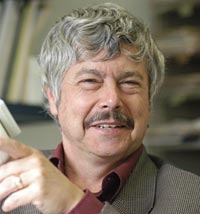 Chronicles of a Science Policy Intern
Chronicles of a Science Policy InternLast week I attended a panel discussion at the AAAS Forum on Science and Technology Policy called Climate, Energy, and Health: Policy Implications. The speakers discussed the intersection of these three big issues, and nearly all of them spoke about climate change’s likely increase in malaria incidence (validating my project!).
Andrew Dobson, Professor of Ecology and Evolutionary Biology at Princeton University, spoke about the role of climate change for infectious diseases. He strongly suggested that vaccines won’t work for diseases like malaria and cholera because immunity builds too quickly, and risk groups would need to be vaccinated every year, which is not a practical long-term solution. To make the disease seem more real, Dobson told the group that malaria is like one 9/11 every day, killing roughly 3,000 children per day in Africa. Studies tracking mosquitoes have shown that 99% of their bites are on cows, somewhat limiting the spread of malaria and that many ticks bite squirrels, somewhat limiting the spread of West Nile Virus. Therefore, higher biodiversity leads to lower vector-borne disease transmission rates. As diseases move out of the tropics there will be a less attractive variety of hosts (animals, etc.), so they will focus on humans.
 Dan Greenbaum, president of the Health Effects Institute, discussed how climate change is going to affect ozone, making a difficult current public health problem more challenging. Ozone causes health problems such as inflammation in the respiratory tract, increased hospitalizations for asthma, and lung disease. Projections suggest significant effects will start to be noticeable in 2050 but we can take action before that to mitigate effects.
Dan Greenbaum, president of the Health Effects Institute, discussed how climate change is going to affect ozone, making a difficult current public health problem more challenging. Ozone causes health problems such as inflammation in the respiratory tract, increased hospitalizations for asthma, and lung disease. Projections suggest significant effects will start to be noticeable in 2050 but we can take action before that to mitigate effects. Kirk Smith, Professor of Global Environmental Health at the University of California-Berkeley, spoke about how health and climate change can be tackled together using a “co-benefit” approach by linking them with society, spreading costs, and creating a political bridge. He spoke about how diet preferences have a huge effect on greenhouse gases (GHG) since livestock produce 20% of all GHG emissions and 30% of total methane emissions. Memorably, he stated, “We could actually eat ourselves into climate change.”
Kirk Smith, Professor of Global Environmental Health at the University of California-Berkeley, spoke about how health and climate change can be tackled together using a “co-benefit” approach by linking them with society, spreading costs, and creating a political bridge. He spoke about how diet preferences have a huge effect on greenhouse gases (GHG) since livestock produce 20% of all GHG emissions and 30% of total methane emissions. Memorably, he stated, “We could actually eat ourselves into climate change.” Carlos Covalan, senior advisor in Sustainable Development and Environmental Health at PAHO-Brazil, spoke about how 3 billion people use solid fuels, such as wood and biomass, in poor countries for basic energy needs like cooking and heating, significantly contributing to the climate change by producing emissions and particulate matter. He put the issue in perspective by saying: Our energy burden is to pay a bill once a month. Their burden is (for mostly women) to carry huge amounts of wood on their backs 1-2 times per week for fuel.
Carlos Covalan, senior advisor in Sustainable Development and Environmental Health at PAHO-Brazil, spoke about how 3 billion people use solid fuels, such as wood and biomass, in poor countries for basic energy needs like cooking and heating, significantly contributing to the climate change by producing emissions and particulate matter. He put the issue in perspective by saying: Our energy burden is to pay a bill once a month. Their burden is (for mostly women) to carry huge amounts of wood on their backs 1-2 times per week for fuel.Reid Detchon, executive director of Energy and Climate at the UN Foundation made the case for why toxic aromatics, like benzene, should be taken out of gasoline. Aromatics replaced lead to provide octane, but could be replaced by biofuels which are potentially low in GHGs and have less negative health effects.
Click here for more about the panel sessions held at the AAAS forum.

Great article! It's important to note the interaction between "buzz" topics in the news. If addressing one problem area will have a positive impact on multiple challenges facing society today we will see support from groups without an obvious vested interest. Support from diverse interest groups provides validation not available when only obviously interested parties are involved.
ReplyDelete